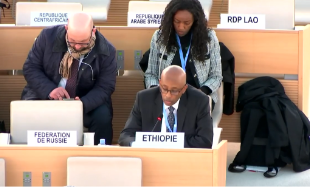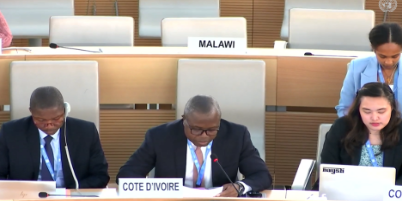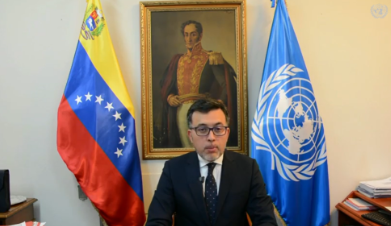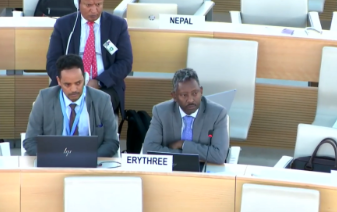The 52nd Session of the Human Rights Council
27 February – 4 April 2023
Item 3 – ID: Commission of Human Rights Experts on Ethiopia
21st March 2023
By Natalia Venegas / GICJ
Executive Summary
On March 21st, Mr Mohamed Chande Othman, Chair of the International Commission of Human Rights Experts on Ethiopia, stated that the situation had evolved significantly. On the 2nd of November of 2023, the Federal Government and the Tigrayan Front (TPLF) signed a cessation of hostilities and a peace agreement, ending two years of armed conflict.
The International Commission of Experts stated that since the signing of the Agreement, the Federal government has pushed for a transitional justice process. This includes its current consultation on the draft. However, according to the chairman, it is too soon to talk about success in the matter. According to the previous reports presented to the council, all parties to the conflict have committed war crimes.
The representative of Ethiopia highlighted the country’s commitment to implementing the argument for lasting peace. He spoke about the increase in humanitarian aid, cease-fire and disarmament, demobilisation and reintegration of all forms of combatants. Compliance mechanisms of the African Union are overseeing this.
During the interactive dialogue, most states highlighted the progress since the signing of the Agreement by the Government of Ethiopia and the TPLF, including improved humanitarian access, delivery of essential services, and respect for human rights. However, they also highlighted the importance of acknowledging the atrocity crimes committed in the recent conflict is critical to supporting transitional justice efforts and enabling a lasting peace.
Geneva International Centre for Justice (GICJ) congratulates the Ethiopian government and the Tigrayan Front (TPLF) for the Agreement reached. However, GICJ wishes to underline the key points that victims reparation is central to the process of ensuring a lasting peace. Furthermore, the peace agreement should have a gender approach so that sexual and gender crimes are judged as independent crimes to ensure accountability for women.
Background
After years of anti-government protests and rising nationalist sentiment, the ruling Ethiopian People's Revolutionary Democratic Front (EPRDF) elected Abiy Ahmed as its new prime minister in April 2018 from its Oromo faction. He took office promising great optimism and strong international support for political and economic reforms. He was praised for quickly making peace with Eritrea. A sweeping amnesty provides for exiled political and armed opposition members of the EPRDF, including Eritrea, to return to Ethiopia or be released from prison.
Spokesmen for the federal government and its supporters, including those in Eritrea, have claimed that TPLF veterans directed a series of violent attempts to undermine or disrupt the government, allegations they deny. Others claim that there has been an increase in fierce anti-TPLF sentiment in government statements and pro-government media. The narrative draws on anti-Tigray racial slurs in Eritrean propaganda during the Ethiopian-Eritrean War (1998-2000), nationalist rhetoric surrounding disputed elections (2004-2006), and the emergence of Oromo ( and Amharic) Activism (2014 -2018).
Hate speech against the Amharic and Oromo communities has increased in the newly competitive and racialized political environment. Political conflict erupted amid intercommunal violence and religious tensions. The conflict had continued and escalated since January 2019, when ENDF launched a counter-insurgency operation, including airstrikes, against the Oromo Liberation Army (OLA) in western Oromia. Four regional states appointed new leaders, and when the National Prosperity Party was formed in December 2019, the TPLF (and some ruling Oromo politicians) refused to join. With the outbreak of COVID-19, the federal government has postponed the election. Influential Oromo opposition leaders were arrested after further racialized violence. Nevertheless, TPLF pushes ahead with September 2020 elections in Tigray. Tigray’s federal and provincial governments declared each other's actions "unconstitutional" and fighting broke out on November 3-4, 2020.
The September 2022 report to the Council concluded that since the 3rd of November 2020, there have been reasonable grounds to believe that serious violations from all parts of the countries have been committed in Ethiopia. The Committee has reasonable grounds to believe that these violations constitute war crimes and crimes against humanity. The report assesses developments in transitional justice and makes urgent recommendations.
Report of the International Commission of Human Rights Experts on Ethiopia
The situation in Ethiopia has evolved significantly. On the 2nd of November of 2022, the Federal Government and the TPL (Tigrayan Liberation Front) signed the cessation of hostilities agreement, ending two years of armed conflict.
Since then, the region has witnessed a significant and sustained reduction in conflict. The Commission welcomed the cessation of hostilities agreement and subsequent agreement regarding the implementation. It mainly includes the commitment to human rights, civilian protection, and humanitarian access and accountability. They highlighted that they look forward to sustaining those efforts countrywide.
Since signing the agreement, the Federal Government has embarked on a series of initiatives. They offered a first step towards the locally owned transitional justice process. These include the current consultation on their green paper “policy options for transitional justice”. Nevertheless, it is too early to assess the progress.
Despite the positive development, which drastically improved security, the scale of the previous violations must not be forgotten. The Commission believes that there are serious allegations regarding the peace agreement and that all parties have committed war crimes and human rights abuses since then.
According to international law, the Federal Government has primary accountability regarding the country. They must investigate and prosecute serious crimes through the Ministry of Justice and the Inter-Ministerial Taskforce, further asking the government to ensure transparency.
Interactive Dialogue
 The delegation of Ethiopia started by stating their complete focus on the full implementation of the agreement for lasting peace throughout a permanent cessation of hostilities signed in Pretoria. The agreement has stopped the conflict and all forms of hostilities. The second pillar of the implementation is a significant increase in humanitarian aid and restoration of services. Another pillar is disarmament, demobilisation and reintegration of former combatants. These undertakings are being overseen by the African Union Monitoring Verification and Compliance mechanism.
The delegation of Ethiopia started by stating their complete focus on the full implementation of the agreement for lasting peace throughout a permanent cessation of hostilities signed in Pretoria. The agreement has stopped the conflict and all forms of hostilities. The second pillar of the implementation is a significant increase in humanitarian aid and restoration of services. Another pillar is disarmament, demobilisation and reintegration of former combatants. These undertakings are being overseen by the African Union Monitoring Verification and Compliance mechanism.
On the 10th of March 2023, the National Rehabilitation Commission held consultations on the demobilisation and reintegration of former combatants. The agreement has also provided transitional measures. These include adopting a transitional justice policy to ensure accountability, truth-telling, redress for victims, healing and reconciliations. At the government’s request, the Ethiopian Human Rights Commission and the OHCHR are supporting the national wise consultancies on transitional justice. To deploy human rights monitors to complete affected areas.
The representative for the European Union called for further progress on the implementation, continued and unimpeded humanitarian access, and the expansion of essential services in conflict-related areas in northern Ethiopia. They highlighted that to fight impunity and contribute to holding those responsible for accounting, independent, transparent and impartial investigations into all allegations of violations and abuses of international human rights law, international humanitarian law, and international refugee law are essential. The Ethiopian Human Rights Commission, the OHCHR and the Commission have all provided valuable input.
The delegate of Côte D'Ivoire, on behalf of the African Group, stated that the African Group welco mes the signing of the agreement for lasting peace. These agreements silenced the guns in northern Ethiopia. He also commended a strong emphasis on human rights and a comprehensive national transitional justice process. The representative also mentioned the efforts made by the parties to implement the agreement and deployment of the African Team of Experts. Also, there should be domestic measures of accountability.
mes the signing of the agreement for lasting peace. These agreements silenced the guns in northern Ethiopia. He also commended a strong emphasis on human rights and a comprehensive national transitional justice process. The representative also mentioned the efforts made by the parties to implement the agreement and deployment of the African Team of Experts. Also, there should be domestic measures of accountability.
The representative of the United States of America welcomed the tremendous progress since the signing of the Cessation of Hostilities Agreement by the Government of Ethiopia and the TPLF, including improved humanitarian access, delivery of essential services, and respect for human rights. Acknowledging the atrocity crimes committed in the recent conflict is critical to supporting transitional justice efforts and enabling a lasting peace. The representative applauded the Government’s commitment to conduct broad public consultations to ensure its transitional justice policy reflects international best practices and the views of the Ethiopian people and is entirely genuine, inclusive, credible, and comprehensive..
The representative of China highlighted the importance of peace in Ethiopia as a country in the horn of Africa. Moreover, welcomes the permanent ceasefire agreement between the government and the TPFL and that all parties concerned will put people’s interests first and open and inclusive political dialogue to include differences.
The delegate of Venezuela stated that the country did not support the resolution that created the commission and the meeting. The reason is that Ethiopia rejected the imposition of the mandate on several occasions. Nevertheless, the efforts of the Ethiopian government are supported by Venezuela to go back to normality. Ethiopia has always been transparent and cooperative with the council.
Ethiopia rejected the imposition of the mandate on several occasions. Nevertheless, the efforts of the Ethiopian government are supported by Venezuela to go back to normality. Ethiopia has always been transparent and cooperative with the council.
The representative of the United Kingdom stated the progress the Ethiopian Government and Tigray People’s Liberation Front have made towards implementing the November 2022 Pretoria Peace Agreement, ending two years of conflict. At last, the delegate launched the following question: “how do you hope to work with the Ethiopian Government, TPLF and AU to ensure robust accountability for human rights violations and abuses?”
The delegation of Eritrea highlighted that neutrality, objectivity and professionalism are fundamental guiding principles of the council's deliberation, including the selection of mandate holders. According to this delegation, some commissioners must be more objective towards the report. Ethiopia's efforts and advancements should be supported. 
Position of Geneva International Centre for Justice
Geneva International Centre for Justice (GICJ) congratulates the Ethiopian Government and the Tigrayan Front (TPLF) for the Agreement reached. GICJ wants to remind the Government that victims’ reparation is the centre of the process of transitional justice and should be the focus of efforts during the implementation of the peace agreement. Furthermore, the peace agreement should have a gender approach so that sexual and gender crimes are judged as independent crimes to ensure accountability for women.
GICJ delivered a joint statement with the International Organization for the Elimination of All Forms of Racial Discrimination highlighting that Tigrayan forces killed civilians and damaged or destroyed infrastructure and property in Kobo and Chenna, in August and September 2021—other acts of violence and brutality, such as beatings and rape of women, accompanied killings. The effect of rape and sexual violence on survivors has been enormous. They face devastating long-term impacts on their physical and mental health.
GICJ also emphasised that the Conflict has led to displacement and lack of essential services for populations. As a result, there is a dire need for humanitarian assistance and protection for 20 million people suffering in the country.
EAFORD and Geneva International Centre for Justice urge Ethiopia to investigate and bring members of its forces who have committed serious violations of international human rights law and humanitarian law to justice. The described violations amount to crimes against humanity, and we strongly condemn the brutal abuses and violations of international humanitarian law. The Ethiopian Government urgently needs to commit to peace negotiations to end the Conflict.
----------------
Ethiopia ID InteractiveDialogue CommissionofHumanRightsExperts TransitionalJustice Accountability Jusice GICJ Geneva4Justice Geneva_Centre_for_Justice









